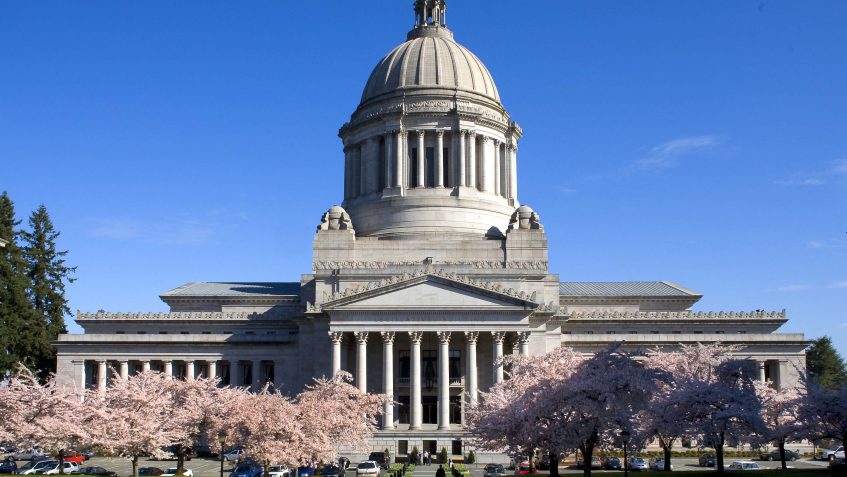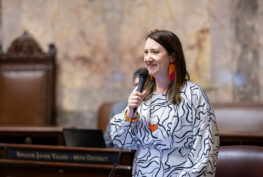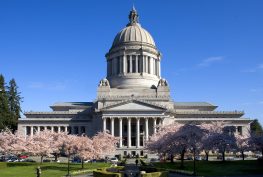OLYMPIA — More than 2,600 people signed in to support the Washington State Wealth Tax proposal during a Senate Ways & Means Committee hearing on Thursday.
The legislation, SB 5486, would create a narrowly tailored property tax on extreme wealth derived from the ownership of stocks, bonds, and other financial assets, with the proceeds dedicated to education, housing, disability services, and tax credits for working families. The first $250 million of assessed value is exempted, meaning only the wealthiest people in Washington would pay the tax, including some of the wealthiest individuals in the world.
Polling has shown significant support among the public for the wealth tax. According to a poll conducted by TargetSmart shortly before the legislative session, 66% of respondents supported the Washington State Wealth Tax proposal.
This support was reflected in today’s committee hearing, where 86% of those signing in with a position were in support of the bill.
“We have an upside-down tax code that’s deeply in need of reform, and we continue to have massive needs for investments in education, housing, services for those with disabilities, and so much more,” said Sen. Noel Frame, the bill’s sponsor. “The wealth tax is a policy option that needs serious consideration. We can ask the wealthy to pay what they owe and tax their wealth with a property tax, just as we tax the wealth of middle-class homeowners with a property tax. It’s time we start rewarding work instead of wealth, and build an economy that works for everyone.”
Public testimony in committee highlighted how the wealth tax proposal would be an effective tool for fixing Washington’s upside-down tax code and making critical investments that Washingtonians need.
“A wealth tax is not novel, it’s been an essential component of, for example, Switzerland’s tax system for more than a century,” testified Professor Brian Galle of Georgetown University. “We’ve learned a lot over the past decade about how to design and implement wealth taxes and how to make them work successfully in places like Switzerland and Spain.”
“Extreme wealth is measured in stocks and bonds and other intangible property that generates large sums of value for whoever possesses it, regardless of whether the wealth holder continues working or not,” said Shaun Scott of the Statewide Poverty Action Network. “We support Senate Bill 5486 and we urge Washington lawmakers to do the same.”
“We strongly support the equitable wealth tax proposed in Senate Bill 5486 and that’s because the proposal would be a boon for Washington’s economy, strengthening community structures like schools and affordable housing, creating thousands of jobs, boosting personal income, and making Washington more attractive for business investment,” said Andy Nicholas, senior fellow at the Washington State Budget and Policy Center. “The notion that significant numbers of millionaires haphazardly up-stakes and move whenever their state tax bills rise defies common sense and has been thoroughly disproven by research on inter-state migration patterns. The truth is that jobs, family, housing costs, and climate, not taxes, are the major drivers of inter-state migration. While inter-state migration is very low among people of all income levels, the wealthy are far less likely to move from one state to another than other households.”
“When it comes time to fund these critical expansions to the Working Families Tax Credit, we cannot keep asking the same working people to cover the costs of the programs they are supposed to benefit from,” said Emily Vyhnanek of the Working Families Tax Credit Coalition, an organization working for tax justice in Washington state. “It’s worth noting that investing in working people has a demonstrated multiplier effect – for every dollar invested into direct cash transfers like the Working Families Tax Credit, $1.5 to $2 of local economic activity is generated. With the revenue generated from this wealth tax, we can fund necessary expansions to this credit, adequately fund special education, affordable housing, and so many more proposals.
Proposals for the 2023-25 operating budget will be released by the House and Senate later this month. The budget proposals will then be negotiated between the chambers and passed before the final day of the legislative session on April 23. Budget writers will have the opportunity to include the wealth tax in their initial proposals, or to incorporate the wealth tax later in the negotiation process.
A recording of the hearing can be viewed on TVW here.


